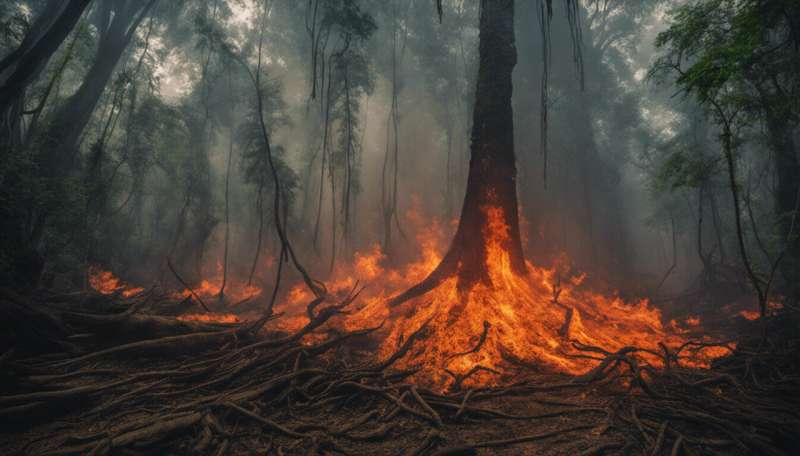Historic Amazon rainforest fires threaten climate and raise risk of new diseases

The fires in the Amazon region in 2019 were unprecedented in their destruction. Thousands of fires had . In 2020, things are no better and, in all likelihood, may be worse.
According to the Global Fire Emissions Database project run by NASA, fires in the Amazon in . In fact, 2020's fires have been the worst since at least 2012, when the satellite was first operated. The over the previous year, and the , according to INPE, Brazil's national research space agency.
Despite the surge in fires, international attention has waned in 2020, likely due to the COVID-19 pandemic. Yet the degradation of the Amazon rainforest has profound consequences from climate change to global health.
Global climate implications
The Amazon rainforest covers approximately —an area larger than Australia—and is home to an astounding amount of biodiversity.
It helps balance the global carbon budget by absorbing carbon dioxide from the atmosphere, and plays a key role in the global water cycle, . A nine nation network of Indigenous territories and natural areas have .
Yet these lands are under siege. As of 2019, an estimated 17 percent of the Amazon's forest cover has been , when regular measurements began and the Amazon was closer to intact.
As the rainforest bleeds biomass through deforestation, it loses its ability to capture carbon from the atmosphere and releases carbon through combustion. If the annual fires burning the Amazon are not curtailed, one of the world's largest carbon sinks will progressively devolve into a carbon faucet, releasing more carbon dioxide than it sequesters.
While the global impacts are dire, the local impacts of these fires are also significant. , which extends far into Brazil and other regions of South America, including in metropolitan centers like , can lead to .
As roads are built and forests are cleared for timber production and agriculture, a checkerboard of tropical forest edges is created. These destructive activities can lead to and a severe loss of species richness anywhere that human encroachment occurs.
Many researchers predict that deforestation is propelling the Amazon towards a tipping point, beyond which it will gradually transform into a semi-arid savanna. If the deforestation of the rainforest continues past a , multiple positive feedback loops will spark the desertification of the Amazon Basin.
Global health implications
. Understanding the root causes of these spillover events that move viruses from animals to humans gives us insight into how to prevent future zoonotic outbreaks. The degradation and fragmentation of tropical rainforests such as the Amazon may be a key factor in this process.
The checkerboard of forest edges , which in turn increases the likelihood of viral transmission and the . Intact forests and high levels of biodiversity, on the other hand, can provide a "" associated with a lower prevalence and spread of pathogens.
The present pandemic may well have had an environmental genesis. Maintaining the Amazon's current high level of biodiversity is vital, both for the health of the global ecosystem and because, otherwise, the of emerging diseases. When we protect the global ecosystem, we also protect ourselves from emerging zoonotic diseases.
Interventions are complex, but the protection of Indigenous territories, the restoration of already degraded lands and, most importantly, continued international awareness of political dynamics and consumer choices, all offer us ways to avert oncoming tragedy. If we do not take a longer view of this pandemic and look upstream for drivers and causes, pandemics will continue to emerge.
Provided by The Conversation
This article is republished from under a Creative Commons license. Read the .![]()





















